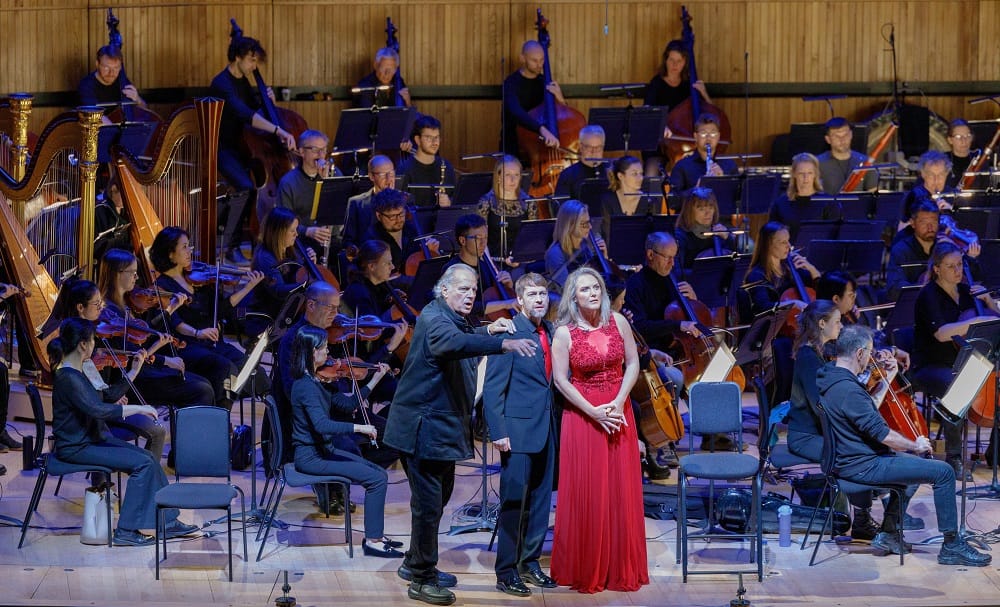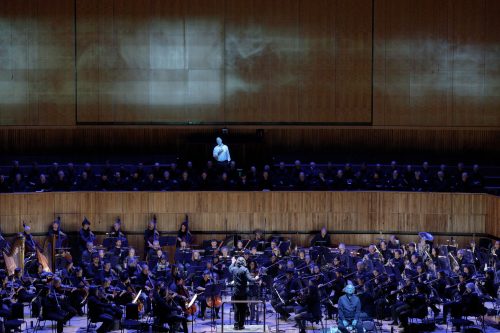
Wagner Götterdämmerung (semi-staged). Soloists; London Philharmonic Choir; London Voices; London Philharmonic Orchestra / Vladimir Jurowski, KBE. Royal Festival Hall, 27.04.2024
Production:
Director – P. J. Harris
Video Designer – Pierre Martin Oriol
Lighting Designer – Mark Jonathan
Lighting Programmer –Rohan McDermott
Cast:
Siegfried – Burkhard Fritz
Brünnhilde – Svetlana Sozdateleva
Hagen – Albert Dohmen
Gunther – Günter Papendell
Gutrune – Sinéad Campbell Wallace
Waltraute – Kai Rüütel-Pajula
Alberich – Robert Hayward
First Norn – Claudia Huckle
Second Norn – Claire Barnett-Jones
Third Norn – Evelina Dovračeva
Woglinde – Alina Adamski
Wellgunde – Alexandrea Lowe
Flosshilde – Angharad Lyddon
The best things come to those who wait, as the saying goes. Or nearly the best things: moments of searing intensity and vocal triumph vied with some unevenness as, for the gods, the World crumbled on a weekend afternoon.
It all began with a London Philharmonic Orchestra ‘Golden Gala Evening’ on January 27, 2018 and Das Rheingold (my review here). Almost exactly a year later, Jurowski conducted Die Walküre; Siegfried followed in February 2020. Then came the time of plague. When Götterdämmerung was due, in 2021, it was supposed to be part of two performances of the complete cycle. Like so much around the pandemic, it was not to be. But we did get our Götterdämmerung, at last, and it was, all things considered, worth the wait. Poignantly, the performance was dedicated to the memory of Sir Andrew Davis; fittingly, both Sir Andrew and Vladimir Jurowski are bound through their activities at Glyndebourne.
Jurowski is known for many things: an orchestral exactitude as finely-honed as his beat and relatively swift speeds are among them. And, although the performance did take around its stated time (six hours 15 minutes, with one 75-minute interval and one of 25 minutes), it did feel fairly swift. Certainly, it never dawdled, although there was the occasional sag in intensity that felt uncharacteristic. Compensating for this was the sheer colour he found from the LPO – not least in the glowering darkness of the low strings and brass at the opening of the second act, a moment as memorable as any of the evening. Jurowski conducted a final act Funeral Music that surely matches any; cataclysmic proportions full of sinewy, creepy string lines and portentous brass. Phenomenal.
Lighting and videos were carefully considered by director P.J. Harris, and non-interventional. Projections around the back of the stage (the organ area was boarded off) added hints of events – most obviously, fire or water – while lighting changes were most often subtle. The performance began and ended in blackness: Jurowski did not take a bow at the opening, but simply appeared after the dimming of the lights, and so it began.
And what a way to begin. The first chord was supremely together, and the First Norn (contralto Claudia Huckle) excelled in her first line, ‘Welch’ Licht leuchtet dort?’ (‘What light is gleaming yonder?). Claire Barnett-Jones’s brighter voice for Second Norn felt a touch weak, and Evelina Dobračeva’s Third Norn was even a notch down on that. But what really came across in this opening scene of the Prologue was how the format of orchestra onstage, antiphonally divided strings and a wall of double basses to the back, really came to the fore. Jurowski’s ear for detail knows no bounds, and yet he knows exactly where he is heading. It was as if, from the off, the orchestra realised this could be a performance of greatness. From first note to last, the dedication from the players was unflagging, as was stamina.
Cast-wise, there was one change, and a significant one: Brindley Sherratt, who had sung Fafner in Rheingold, was due to sing Hagen. Yes, I mourn the opportunity to hear what surely would have been a great assumption; but there was a top-flight substitution: Albert Dohmen. Hagen must be very much in Dohmen’s mind, voice and DNA, as he sang it at MUPA Budapest in June last year under the baton of Adám Fischer; it certainly sounded like it. This was a performance of utter confidence and utter knowledge. This is not a black bass, rather a more human bass-baritone; his Hagen was far from mono-dimensional, which made Hagen’s Watch (‘Hier sitz’ ich zur Wacht’ / ‘I sit here on watch’) absolutely spellbinding.
But, of course, the two main protagonists must be up for scrutiny. Svetlana Sozdateleva sung Brünnhilde in the Jurowski Walküre (the role was sung by Elena Pankratova in Siegfried), and I see from the Walküre review that Sozdateleva exhibited similar weaknesses to those on display in the final part of the Ring. Although the final stretch (the so-called ‘Immolation’, from ’Starke Scheite schichtet mir dort’ / ‘Heavy logs heap up for me here’) had its moments of electricity vocally, Sozdateleva too often felt approximate of line, way too uncontrolled in vibrato, and sloppy of diction. She did save herself for her peroration, but even this final stretch was uneven. The Siegfried was Burkhard Fritz, taking a role he last sang nearly a year ago at the Vienna State Opera (there under Franz Welser-Möst); his voice is strong yet appealing, and although he clearly paced himself (who wouldn’t?) the dramatic grasp was there throughout. Most importantly for this opera, Fritz has a fine low register (what the Götterdämmerung Siegfried really needs is a baritenor) as well as a ringing top. The success of the combined ‘Heil’s of Siegfried and Brünnhilde was as much the achievement of Jurowski’s pacing as the singers, though, a true confluence of energies.

It is an indication of Fritz’s performance that his dialogue with Hagen after his entry in Act I seemed perfectly Wagnerian on all levels: Another important dialogue – that between Alberich and Hagen at the beginning of the second act – was superb, the experienced, commanding Alberich of Robert Hayward at the back of the stage in front of the organ, Hagen at the front; not only was Hayward vocally impeccable, his acting was one of the highlights of the performance.
Taking a step up from a Valkyrie (Helmwige), Sinéad Campbell-Wallace proved that her career remains on an upward trajectory. Her Leonore (Fidelio) with Insula and Laurence Equilby was a triumph both in Paris and in London (review); here, as Gutrune, she was certainly impressive again, but the thought did flit in that perhaps she is not a natural Wagnerian, and that there is still some work to be done here. That said, it was certainly the easiest thing in the world to believe her joy at Siegfried’s return in Act II.
The Estonian mezzo-soprano Kai Rüütel-Pajula reprised the role of Waltraute from Walküre (then listed merely as ‘Kai Rüütel’). She is a brilliant singer with the greatest future: she has been through both the Royal Opera’s Jette Parker scheme, and the Dutch National Academy, and lists a number of Wagnerian roles in her repertoire. Her voice is strong yet beautiful and it was a perfect assumption on every level.
The difficult role of Gunther was sung by another ‘Gunther’: Günter Papendell, who seemed to rather warm into the part, feeling and sounding much more settled in the second act than in the first.
Three Norns begin Götterdämmerung; three Rhinemaidens begin the final act, and it surely is impossible to imagine a more blended, beautiful sound as the latter greet the sun (‘Frau Sonne sendet lichte Strahlen’ / ‘The sun-goddess sends her bright-shining beams’). Alina Adamski, Alexandra Lowe and Angharad Lyddon did the honours, two of whom I have praised previously: I called Lowe ‘one of the finest of the young generation of singers’ in an AAM concert in November 2023 (Music for an Empress), and praised Lyddon most recently as Marta/Pantalis in Chelsea Opera Group’s 2019 performance of Boito’s Mefistofele. The Rhinemaidens’ interactions with Siegfried, too, were perfectly calibrated by all concerned, Jurowski conjuring miracles of beauty from the orchestra.
A little bit of creativity here in Act III, as Siegfried’s ‘body’ was represented by his jacket. But for the final Immolation Scene, all attention was on Sozdateleva. It was a variable account as intimated above, but interesting that she eschewed the usual ‘Erda impression’ (at ‘Alles weiss ich’ / ‘All things I know’), staying very much ‘in voice’, and it worked well. But it was the dramatic climax created by Jurowski’s carefully-plotted trajectory that made the final stretch work so very powerful. And as if there was proof needed of the hard-welded bond between Jurowski and the LPO, the sheer control he – and they – demonstrated in the Luftpause just bars before the work’s conclusion was masterly.
The London Philharmonic Choir, bolstered by London Voices, provided one of the finest choral contributions to any Götterdämmerung I have heard: a remarkable wall of male sound, sculpting the ‘Heil dir, Gunther’ to a fearsome climax.
There is always a feeling of awe at the end of this piece: hearing and seeing Götterdämmerung in Gothenburg fairly recently (directed by Stephen Langridge) had an even greater impact, but then again it was staged, and brilliantly so. Bravo, then, to Jurowski and his players and cast. The LPO play for him like few, if any, others.
All English translations of Wagner’s text taken from Wagner’s “Ring of the Nibelung”: A Companion, The Folio Society, 2020, translation by Stewart Spencer. Images © LPO
Hearing the orchestral sections here – “Dawn and Siegfried’s Journey,” “Siegfried’s Funeral March” – reminded me of an all-Wagner concert with this orchestra with Klaus Tennstedt, and also, elsewhere in the concert, with Jessye Norman.
Not the same concert, but one in Japan, here’s Tennstedt and the LPO in “Siegfried’s Death and Funeral March”:
… and here‘s the “Immolation Scene” from the classic EMI compact disc that came out following that London concert (albeit in Warner reissue):
The Jessye Norman/Tennstedt/London Philharmonic Orchestra is available from Amazon here; interesting that bought new it is £16.97, but there is a second-hand copy going at the time of writing for £1.72. Here’s the Spotify:
.. and here’s a link to iDagio (the cover here is of the Warner re-release):











